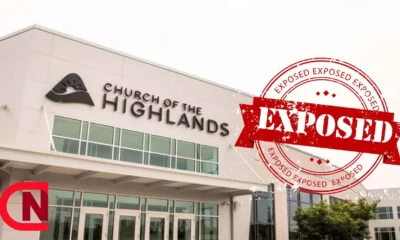US News
Why do they call the Church of the Highlands a cult?
Published
2 months agoon
By
Admin
The Church of the Highlands is a large and influential evangelical Christian megachurch based in Birmingham, Alabama, founded in 2001 by Chris Hodges. Over the years, it has grown to become one of the largest churches in the United States, with tens of thousands of members and multiple satellite campuses. However, despite its size and popularity, the church has faced controversy and criticism, with some critics labeling it as a “cult.” This label is often used in a derogatory sense and implies that the church engages in manipulative, authoritarian, or harmful practices that deviate from mainstream Christian teachings. But why do some people refer to the Church of the Highlands as a cult? Let’s explore the reasons behind these claims and whether they are valid.
Definition of a Cult
To understand why the Church of the Highlands has been called a cult, it’s important first to define what a “cult” is. A religious or social group with abnormal or unconventional beliefs and practices, frequently under the direction of a charismatic leader who requires complete devotion, is referred to as a cult in traditional usage. Cultures are typically characterized by
- authoritarian leadership, where a single leader or small group exercises excessive control over members.
- Manipulation and exploitation: members are often coerced into donating large sums of money, labor, or loyalty, sometimes at the expense of their personal well-being.
- Isolation: cults often isolate members from the outside world, including friends and family, to create an insular community that is dependent on the group.
- Exclusive beliefs: cults tend to believe they have exclusive access to “truth” and view outsiders with suspicion or contempt.
Now, let’s examine whether any of these characteristics apply to the Church of the Highlands and why some people may perceive it this way.
Size and Influence

One of the primary reasons why some critics label the Church of the Highlands a cult is its sheer size and influence. With over 20 campuses and an estimated weekly attendance of more than 50,000 people, it is one of the largest churches in the U.S. Its growth has been rapid, and its influence extends far beyond its local community.
Megachurches, by their nature, can sometimes resemble insular communities because of their size. Members often attend social events, Bible study groups, and volunteer programs, which can create a sense of exclusivity. Critics argue that the Church of the Highlands’ extensive small group programs and volunteer demands could create an environment where members’ entire social lives revolve around the church. This leads to the perception that members are being manipulated or controlled, as their entire support system becomes church-centered.
Charismatic Leadership
Renowned in evangelical circles for his charisma, Pastor Chris Hodges is the head of the Church of the Highlands. While charismatic leadership is not inherently negative, it can become problematic if the leader demands unquestioning loyalty or obedience. Some critics of the church have pointed to Hodges’ prominent role and the adoration of his followers as signs of a “cult of personality.”
In religious contexts, a cult of personality occurs when the leader is elevated to a near-mythical status and questioning the leader’s authority is discouraged. Some former members of the Church of the Highlands have claimed that Hodges and other leaders within the church exert significant control over the congregation, discouraging dissent or critical thinking. However, there is little evidence to suggest that Chris Hodges demands absolute loyalty or that his leadership crosses into authoritarianism.
Financial Pressure and Tithing
One common critique of megachurches is the emphasis on tithing and financial contributions. The Church of the Highlands, like many evangelical churches, encourages its members to tithe—giving 10% of their income to the church. Critics argue that this financial pressure can be manipulative, especially for lower-income members who may feel obligated to give money they cannot afford.
In some cases, cults exploit their members financially by demanding large sums of money and promising spiritual rewards in return. While the Church of the Highlands does promote tithing, it is a common practice in many Christian denominations and not unique to this church. Additionally, there is no evidence to suggest that the church forces members to give or exploits them financially. However, the emphasis on tithing and the church’s prosperity gospel message—which suggests that financial blessings are a result of faith—can contribute to the perception of financial manipulation.
Exclusivity and Doctrine
Another characteristic of cults is the belief that they have exclusive access to the truth or that their interpretation of doctrine is the only correct one. The Church of the Highlands follows mainstream evangelical Christian doctrine, but like many evangelical churches, it places a strong emphasis on its particular interpretation of the Bible and Christian teachings. Critics argue that this can create a sense of exclusivity, where members believe they are part of a special group that has a deeper understanding of faith than others.
Additionally, the church has faced criticism for its stance on controversial social issues, including LGBTQ+ rights and racial justice. Some former members have claimed that the church’s teachings on these issues are exclusionary and intolerant, which has fueled claims that the church fosters an “us vs. them” mentality. While the church’s stance on these issues aligns with many other evangelical churches, the perception of exclusivity can contribute to the cult label.
Controversies and Scandals
In recent years, the Church of the Highlands has been embroiled in several controversies, which have contributed to its critics labeling it as a cult. In 2020, Chris Hodges faced backlash after it was revealed that he had “liked” social media posts by a far-right activist, which were seen as racially insensitive. This led to protests and calls for accountability, with some critics accusing the church of promoting racism and intolerance.
Additionally, the church’s close ties to the Association of Related Churches (ARC), a church-planting organization that has faced its own scandals, have raised concerns about transparency and accountability. Some former members and critics argue that the church’s leadership has been more focused on protecting its image than addressing these issues, which has led to further claims of cult-like behavior.
Conclusion: Is the Church of the Highlands a Cult?
While the Church of the Highlands has faced criticism and controversy, the evidence suggests that it does not meet the criteria for being a cult in the traditional sense. The church’s size, charismatic leadership, emphasis on tithing, and exclusivity in doctrine are common features of many evangelical megachurches, but they do not necessarily constitute cult-like behavior.
That being said, the church’s fast expansion, exclusive membership, and leadership scandals have contributed to the impression that it is a dominating or manipulative organization. Some former members and critics may feel that the church’s practices have crossed the line into manipulation or authoritarianism, but this seems to be a matter of perception rather than concrete evidence.
Ultimately, whether the Church of the Highlands is considered a cult depends largely on one’s definition of the term and personal experiences with the church. While the church may have some characteristics that resemble cult-like behavior, it operates within the framework of mainstream evangelical Christianity and does not appear to engage in the extreme practices typically associated with cults.
Also read All About North Point Church Pastor Resigns Controversy
ARK: Survival Evolved Game Icons and Banners

cute:i1cdycptg50= drawings

Understanding New York Sports Club Membership: What It Offers and What Affects the Cost

Safety Tips for Compressed Air Dryers

drawing:23vyczbybxu= billie eilish

drawing:056aoyw74ce= rick and morty

drawing:4oyh4y0aqsa= santa claus

24 Hour Fitness Cost: How Much Is 24 Hour Fitness Membership?

drawing:7barsug8u0w= spider man

drawing:_ckgvun2dpk= flower

How can online food delivery sales increase and attract the maximum number of customers in 2023?

MEP BIM: Revolutionizing Building Infrastructure Design

Revolutionizing Industries with ChatGPT

Resolving the Israeli-Palestinian Conflict: A Comprehensive Analysis

Skillful Passion: Wisconsin’s Dominant Volleyball Team

Virtual Reality Rental: A Futuristic Experience

Negin Behazin vs Dignity Health: Comprehensive Comparison

Unlocking the Potential of cryptonewzhub.com Internet

iPhone 14 Pro Max: Unveiling the Next Level Innovation

Unraveling the Mystery: Robert Card’s Tragic Passing
ARK: Survival Evolved Game Icons and Banners

cute:i1cdycptg50= drawings

Understanding New York Sports Club Membership: What It Offers and What Affects the Cost

Safety Tips for Compressed Air Dryers

drawing:23vyczbybxu= billie eilish

drawing:056aoyw74ce= rick and morty

drawing:4oyh4y0aqsa= santa claus

24 Hour Fitness Cost: How Much Is 24 Hour Fitness Membership?

drawing:7barsug8u0w= spider man





